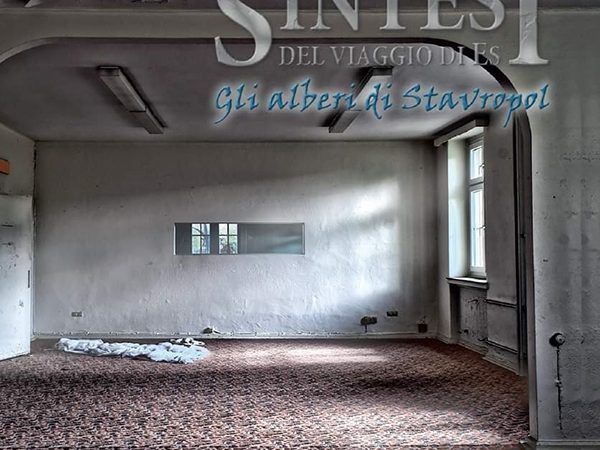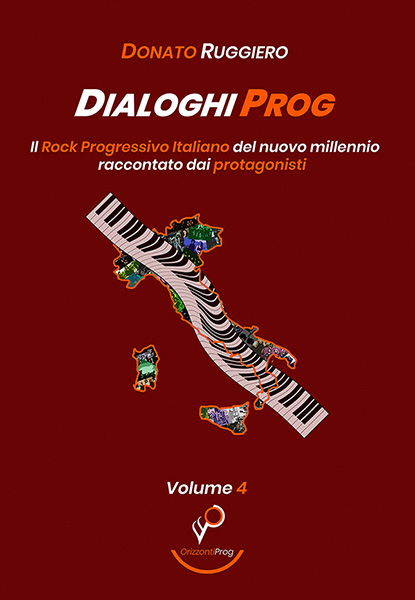Room 101 (2021)
Self-production
Lockdown 2020: an unusual period in our lives. Everyone reacted in their own way to what was, to all intents and purposes, an “imprisonment”. The Karmamoi projected the ‘cell’ in which they spent those moments directly into another closed space: “Room 101”.
But what is Room 101? You only have to read “1984”, George Orwell’s masterpiece, to find it out. In a nutshell, that room is a special torture chamber used by the officials of the Ministry of Love with the aim of eliminating, through brainwashing, any form of human feeling in the prisoner, a place where rebellious thoughts are annihilated, and where the mind is purged and made virgin ready to be rewritten by the propaganda and demagoguery of Big Brother and its officials, it’s the emblem of the novel and it’s what I personally fear most (Daniele Giovannoni, words taken and translated from the Italian interview. To read it click here).
This is where Room 101, Karmamoi‘s new album, took shape. Inspired by the novel, the band “revisits” some of its themes, adapting them to the present and focusing on the human mind and its weaknesses. To succeed in their intent, Daniele Giovannoni (drums, keyboards and backing vocals), Alex Massari (guitars) and Alessandro Cefalì (bass), asked for “help” to Sara Rinaldi (vocals), Adam Holzman (piano and Moog Solo in Newspeak), Steve Unruh (violin and flute in Newspeak, Memory Holes and Drop by Drop), Emilio Merone (piano and keyboard in The New World), Valerio Sgargi (tenor voice and backing vocals) and Francesca Zanetta (solina in Memory Holes).
And so, when the music reveals itself, evocative, dark and magnetic atmospheres begin to flow in front of our eyes, a mixture of contrasting sensations and emotions that make their way following unpredictable, articulated, restless, hypnotic routes, with that claustrophobic Orwellian element that permeates the whole work. And it’s not only the sound aspect that makes the album precious to listen to: there are also excellent lyrics, superbly rendered by Sara Rinaldi’s voice, and an artwork (by Joel Barrios) that, in its dark chromaticity, fully reflects the content of the work.
Memory Holes. A soft start, with embracing arpeggios and the warm voice of Sara Rinaldi, welcomes us in the opening track. Then Giovannoni’s “skins” make their entrance on the scene and the song accelerates, then flows into a rough sea of dark and esoteric tones, a bit like Annot Rhül in “Leviathan”. And after a change of pace that almost moves towards Rush, an “other worlds” atmosphere returns, with an apt addition of Unruh’s flute. And just when you think the track is set, techno drums shake things up, giving way to Depeche Mode-esque moments before the whirling, evocative finale. A start that is already worth the whole album. Memory is a crime.
Drop by drop / it will erode the rock. / Drop by drop / it will make you feel alone and lost. […]. Drop by Drop comes to life in a romantic way, with the warm and fascinating voice of Sara, a bit like Donella Del Monaco, supporting and guiding everything, before the Wilsonian opening. Then the singing starts again, with slow, almost suffered drum beats to add pathos to the painting. And when Unruh’s violin takes over, all becomes poetic, a caressing mixture, almost “spiritual”, which acquires warmth and brightness until it explodes. The following guitars, keyboards and rhythmic plots give off a magnetic raven essence, and Massari’s solo takes the stage for good measure, launching us into a Morriconian orbit at the end (with chilling vocal games).
Evanescent, almost impalpable, Dark City, magically led by Sara Rinaldi’s voice, surrounded by an ethereal, delicate, almost Hautville-like “sound dress”. Suddenly everything changes drastically, the white is replaced by black, the calmness by alienation, and the hosts build a dense claustrophobic plot almost “on the edge” of Nine Inch Nails industrial. Everything is softened when Sara appears on the scene again, bringing the initial sound harmony as a dowry. But the “evil” is around the corner and comes back strongly in the final minutes, with a furious gallop.
Giovannoni’s delicate, almost caressing piano welcomes us to Zealous Man, while Sara’s soft, warm voice lays gently on the notes of the instrument, then reinforced by Massari’s strings. What follows is dense and evocative, enveloping layers of sound that are then guided by vocals, before returning to the “starting point”. And after another “sensorial deflagration”, the guitar takes over the scene with an excellent solo, enriched by well-set beats provided by the rhythms and keyboard “veils” of the Giovannoni/Cefalì duo. But the conclusion is far from becoming clear, so the piano comes back to the fore, sweet, subtle, with rising choirs to accompany it. Then Sara’s vocal class takes the stage again, leaving room for a strange emptiness and the electric, alienating shudder that follows. A remarkable episode. […] He is not your father / He is not your mate / He is a zealous man / He’s watching you / He is not your guide / He is not your truth / He is a zealous man / Who’s tricking you […].
The instrumental Newspeak starts off very suggestively, flowing between the notes of guest Adam Holzman’s piano. It’s a magic that’s progressively (not completely) undermined by distortion and drums. Then, following Giovannoni’s decisive pace, Holzman’s Moog comes into play, skilfully creating an atmosphere that perfectly combines chiaroscuro elements, well supported by the excellent work of Cefalì/Massari. But it is again the piano, poetic, that takes over the episode, launching a very romantic moment.
[…] We take control purifying you / And Your Memory / Ripping minds / Wreaking pain / Restoring thoughts / In this room you can / Redeem yourself and pray, / Imploring us / Forgiving you now […]. And after Newspeak’s poetry, we plunge into the anguished Room 101. Giovannoni and Cefalì hit hard and, with the help of Massari’s granite distortions, build an unassailable castle, with Sara Rinaldi’s voice that fits perfectly. And when Karmamoi accelerates everything becomes incandescent, with sensations like The Mars Volta. And the black essence leads us to the conclusion, with the vocal games of the final minutes as “cherry on the cake”. Freedom is Slavery / War is peace.
The album ends with The New World. A sense of excitement permeates the opening guitar notes, and the crescendo that follows, carried along by the rhythms, confirms the feeling. And when the rushing ‘river’ reaches the ‘sea’, the power fades, but it is replaced by a thick blanket of tension into which Sara’s voice plunges headlong. What follows is lived on the edge of nerves, a “gloomy” path that moves between Lovecraftian atmospheres and splinters that touch metal territories. But nothing is eternal and everything vanishes in the almost impalpable segment at two-thirds of the way through, where the delicate singing makes its own way. And finally it’s a feast of colours, with the clash between Merone’s keyboard arabesques, the drums’ rides and Massari’s distorted aggression. Here is the world we’ve drawn for us / Super troopers and digit guns / Satellites fill up the Sky / Like Bounty killers for all our future crimes / Silent Waves are tracking us / no need to hide, no need to run / Watching us in this new world / On the superscreen, we are one and none / Walking around with gloomy faces / and staring at each other, we look the same / Wearing masks of efficiency, / in the name of new foes, / They are stepping on our rights […].
Room 101 is undoubtedly a candidate to be one of the top albums of 2021 on an international level.










Leave a Reply